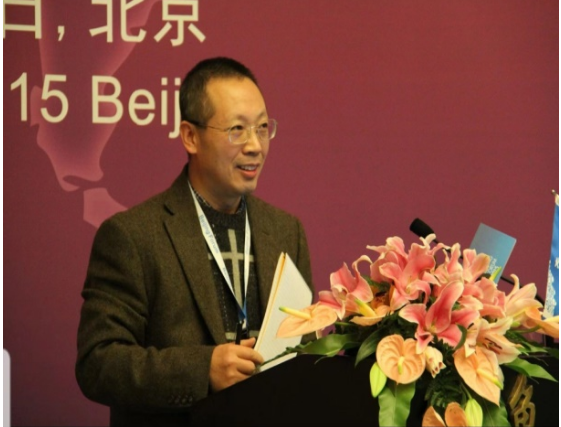Published : August 07,2023
By Qingjie XIA

In less than 70 years’ time, China successfully transformed herself from a backward agrarian country into an industrialized one. People still remember this transformation process freshly. So what general principles of political, economic and social development have emerged from the rise of China? After reading Professor Yi WEN’s latest book “The Code of Scientific Revolution”, I have got some answers to this question.
First, a country’s scientific and technological capabilities come from powerful state-owned scientific research institutions. Professor Wen studied the history of European scientific revolution and industrialization, finds out that all major scientific and technological breakthroughs were the result of state-funded research projects. It wasn’t the result of the so-called “freedom, democracy and rule of law”, nor the result of the ancient Greek scientific development; the underdevelopment of science and technology before the founding of New China was not related with the lack of scientific thoughts in the ancient China or its authoritarian regime, but because of the shortage of state funding; the success of the “two bombs and one satellite” after the founding of New China was the result of the Chinese government’s attention and the countrywide support; without state funding, scientists cannot rely on scientific research to make a living, let alone scientific research and technological development.
The achievements of New China’s scientific and technological development reveal the first core secret of the scientific revolution of Europe, America and Japan since the European Renaissance.
Second, state-owned enterprises (SOEs hereafter) are the core tools of national economic development. Also like a strong person must have developed limbs, a number of strong SOEs are the strong arms and legs of a country. Professor Wen found that early European countries established a large number of SOEs or State-Chartered-Enterprises (SCEs) (such as city state Venice’s arsenal manufacture in the Renaissance period, the East Indian Company and West Indian Company in countries such as the United Kingdom and the Netherlands) for the purpose of national development, and even allowed these SCEs operating in the colonies to have armed forces, and if necessary, these SCEs can occupy colonies, manage civil and criminal justice, mint, collect taxes, launch wars, overthrow colonial governments through force, plunder local resources for free, to ensure investment returns and pay income taxes to the state.
The great contribution of the SOEs of New China revealed the second core secret of the early industrialization of European countries. The difference is that New China never has and never wants to have colonies, nor does it rely on slave trade and drug trade to accumulate capitals needed for further development, but let those SOEs building up transportation, communication, energy and power to help the country. These infrastructure facilities contributed to the Chinese economic miracle. Instead of replacing private firms, the Chinese SOEs provide products and services that private firms cannot or are slower to supply.
Third, encourage market economy and non-state-owned enterprises. Since the Industrial Revolution started in the 18th century, various industrial and commercial enterprises have gradually replaced farmers as chief players of the societies. While making profits, these enterprises also provide society with capital and consumer goods, employment opportunities, and tax revenue for state. In addition, in the contemporary international competition, whether a country has agglomerations of strong high-tech enterprises is the main indicator of the country’s international political and economic competitiveness. Improving the market mechanism and encouraging the development of non-state-owned enterprises have become the core model of contemporary national development.
Fourth, institutional arrangements are the result of political, economic and social development, not the premise. Professor Wen also revealed by studying the history of European industrialization since the Renaissance in Europe that the development of various institutional arrangements in the process of industrialization in Europe, America, Japan and other countries were the consequences of those countries’ adapting to the needs of economic development, not that technological progress and economic prosperity of the West were brought about by the so-called “liberal, democratic and rule of law” as claimed by the institutional economics.
Since the founding of the People’s Republic of China, especially since the reform and opening up, the various institutional arrangements have been continuously established and improved according to the needs of China’s political, economic and social development. The reason why the New China did not believe in any kind of doctrine was mainly because the Chinese Communist Party (CCP hereafter) found in its long-term revolutionary practice that any time when things were done according to the so-called dogma, the revolutionary cause would suffer setbacks and failures; on the contrary, if policies and measures were formulated realistically, the revolutionary cause and economic construction will be victorious and successful.
Fifth, participating in international political and economic competition is the core driving force for a country’s political, economic and technological development. Professor Wen found that after the Renaissance, European countries fought over a hundred wars for territorial expansion and other interests, such as the Hundred Years War (1337-1543), the Thirty Years War (1618-1648), the First Anglo-Dutch War (1652-1654), Second Anglo-Dutch War (1665-1667), Third Anglo-Dutch War (1672-1674), Fourth Anglo-Dutch War (1780-1684), Nine Years War (1688-1697) and so on. In order not to be wiped out by the enemy in the war, governments of various countries set up ordnance departments and even state-owned academies to try their best to develop artillery and gunpowder.
The famous Italian scientist Galileo was an artillery expert at the Ordnance Bureau of Florence, the artists Leonardo da Vinci and Michelangelo were ordnance engineers, and Lavoisier was a chemist who found the secret of oxygen burning, greatly improved gunpowder and hence created the modern Chemistry as a science at the French Academy of Sciences. It can be said that the frequent wars between European countries after the Renaissance led to the occurrence of the scientific and technological revolution, and the application of the achievements of these technological revolutions to business led to the occurrence of the industrial revolution.
Sixth, building the most thoroughly open society is a necessary prerequisite for economic development. While opening up the political participation to the people, China also empowers the masses, especially the hard-working people, with economic rights such as land and the right to receive public educational and medical services. Only when the vast number of people develop can a country develop.
After the founding of the People’s Republic of China, the most thorough land system reform in human history was implemented, and the land of landlords and capitalists was confiscated and distributed equally to the vast masses of peasants who had no or little land. Later, the collectivization of rural land and the nationalization of urban land were implemented.
Without the collectivization and nationalization of land, there would be no large-scale infrastructure construction and industrial parks that take up a lot of land. After the founding of the People’s Republic of China, the social service affirmative action measures were to open the nine-year compulsory education and public medical services to all citizens. In this regard, Nobel Laureate in Economics Amartya Sen said that before the reform and opening up, the new China had prepared the human capital foundation for the economic take-off after the reform and opening up.
Last but not the least, the core prerequisite for a country’s economic development is that the country must have a strong central and local governmental structure dedicated to the well-being of the vast majority of its citizens. Just like a capable person needs a strong and developed brain, a country must first have a strong nerve center, that is, the central government that focuses on the political, economic and social development of the country and its organizational structure and framework that extends to the grassroots people, and this government must put the interests of the people, especially the working masses, at the core. Professor Wen concluded that in the waring period from the end of Renaissance to the end of 19th century, the European countries whose decision-making process and resources were gradually centralized won the wars and survived, whereas those who remained decentralized lost and disappeared.
The Chinese government under the leadership of the CCP is such a government whose sole purpose and goal is to “serve the people wholeheartedly” and nothing else. In addition, the CCP and the People’s Army led by it are a great political party and a great army that have been honed in the long-term domestic revolutionary wars and anti-aggression wars.
The CCP has its own unique ideology, invincible and strong will, and strict organizational structure and discipline. It was under the leadership of such a strong political party that New China headed off the threats posed by the Korea War (1950-1953), Vietnam War (1964-1973), and Sino-Indian Border War (1962), and won a peaceful environment for China. The governmental governance in many developing countries has been weak. If governmental regulations are relaxed in accordance with the neoliberal economic dogma, the political and economic governance of many developing countries will not be realized, let alone economic growth and development.
All in all, China’s economic miracle shows the universal laws of a country’s economic take-off, that is, a country’s scientific and technological progress is the result of state financial support, SOEs are a powerful propellant of a country’s political, economic and social development, non-state-owned manufacturing enterprises are main players of the societies, and institutional arrangements are the result of a country’s economic development not the prerequisite of it. International political, economic and military competition leads the state to fund scientific and technological development and promote economic development.
Opening economic rights to all citizens and providing basic social services such as education and medical care are the preconditions for a country’s economic and social development, and the last and most important point is that a strong, promising, people-oriented central and local government organization is the most important prerequisite for a country’s political, economic and social development. The above principles emerged from the industrialization process of China demonstrated that without active governments’ influential function, no country would be able to develop.
About the author: Qingjie XIA, Ph.D. in Economics (University of Bath, UK), Professor at the School of Economics, Director of the Center for Human and Economic Development (CHEDS), Peking University, Beijing, China.
 Africa -China Review Africa -China Cooperation and Transformation
Africa -China Review Africa -China Cooperation and Transformation
